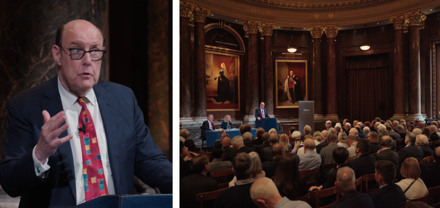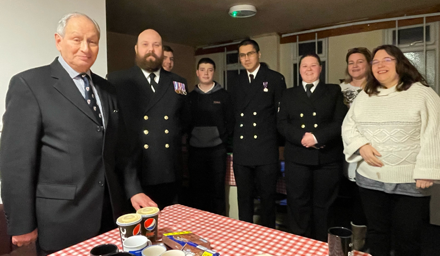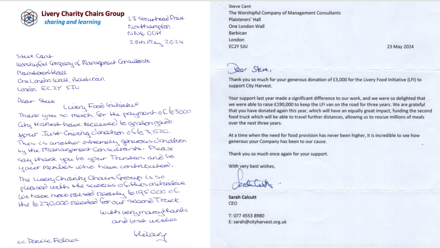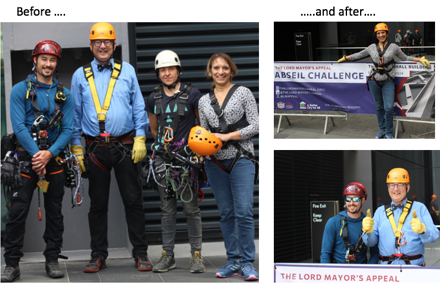|
Welcome to Issue 10 of the Newsletter dedicated to all our Company’s diverse philanthropic efforts. The scope is broadly: updates on our pro bono activity and the work of the Company’s Charitable Fund. This issue majors on the latter, and details the various grants made recently. Special thanks this time to IPM Chris Sutton for several contributions. But before we get to them…..
The Purpose Exchange
In the last Issue of GTKP we featured an update on The Purpose Xchange. We have now received an interesting offer from Jonathan Collie, the CEO, (who has been a long-term client, a speaker at a past Charities Supper and also was a guest at our Education Lecture last week (more on that in the next Company Newsletter).
Jonathan: "We are grateful to the Worshipful Company for the grant and mentoring support provided during our earliest bootstrapped start-up phase. That vital lifeline enabled us to develop our initial offer and become financially self-sustaining. We are now steadily growing our global community of purposeful people and helping major organisations build purpose-led workforces and powerful brands.
As a thank you, we are offering 50 free places on our unique online workshops...". We will communiate details of this unique offer in the near future, so watch this space.
The Future Charity Chair
In the last GTKP Newsletter we reported that the Charitable Fund had agreed to co-sponsor (£4,000) a research project with Bayes Centre for Charity Effectiveness (CCE), looking at the essential attributes that Charity Chairs of the future will need to embrace.
Second Warden Malcolm McCaig chaired the project’s Steering Group on a pro bono basis, and shared the leadership for the research with Alex Skailes, Director CCE and a member of WCoMC. The project is now complete. At a launch meeting on 12th June, at Bayes Business School, the final report was unveiled. An electronic copy of the final report is available here.
The launch event attracted over 150 attendees and generated a lot of interest. In addition to examining the skills and attributes for Chairs in the charity sector, the research also highlighted the challenges future Chairs will face, different models of leadership and governance, and how we need to reshape the pipeline of candidates who will take up such a role.
Malcolm, together with the Chairs of the Charitable Fund and the Pro Bono Committee, will be considering how best to leverage the research and support the opportunities it presents.
Why is philanthropy so difficult these days?
The Master, PM John Pulford and I, were privileged to attend a recent lecture on the interesting subject of “Why is philanthropy so difficult these days?”. The lecture was delivered by Sir David Cannadine - Dodge Professor of History, Emeritus at Princeton University and Visiting Professor at the University of Oxford and Past President of the British Academy. The lecture was at Drapers’ Hall on 14th May, with about 300 people in attendance.
Sir David has every appearance of being a somewhat dry academic, but he delivered a scintillating 30-minute lecture which was both thought-provoking, erudite and heavily laced with dry wit. His basic thesis was that these days philanthropy has become far more difficult than it was in the past. This is true from the perspective of both philanthropists - those wanting to give money away - and beneficiaries - those that would like to receive some grant funding.

Philanthropists have increasingly required much more of applicants. This is most apparent in the need for charities generally to be able to demonstrate their organisation’s social impact and successful outcomes for their beneficiaries, and to provide regular updates…. One only needs to look at the website for any grant making body these days to see that most are quite precise about what they expect to see from applicants and that they are also very focused on defined groups of beneficiaries.
Looked at from the perspective of beneficiaries themselves, things are more difficult too. Recipients of grants are increasingly mindful of where the money has come from. Sir David gave several examples from the recent past where major organisations have discontinued or walked away from potentially large sources of grant funding because of moral doubts about the origins of the funds. The most obvious example that he cited was the Sackler family foundation, where many organisations have taken action to distance themselves from the adverse publicity surrounding the opioid epidemic in the United States. In the past charities did not worry too much about sources of funds but were just pleased to get them.
Sir David illustrated these points with a frankly very amusing analogy using the “Three wise men” and their gifts to baby Jesus. They came with gifts, said Sir David, with no preconditions, no expectations, and no requirements for providing situation reports after the event! By the same token baby Jesus, as the recipient, was not concerned with the provenance of the gifts, whether the frankincense and myrrh came from sustainable forests, or whether the gold came from mines with a good industrial relations record and so on… They were simply gifts!
It is not possible to do justice to the breadth of Sir David’s lecture here, but that gives you the flavour, I hope.
I am sure that many of our readers, acting as Trustees or Treasurers for charities and not for profit organisations, will bear witness to the challenges when applying for grant funding currently. Things have certainly tightened up post COVID.
The lecture was part of “The Better World Lecture Series”, sponsored and organised by CCLA Investment Management Limited and Marylebone Executive Search and our thanks go to them for an enjoyable event and reception afterwards. You can watch the whole lecture here:
Pro Bono Case Study
The Fore – Grant Assessor
Your Editor reports: Given the nature of the article, above, I thought I would include a short pro bono case study based on my own recent experiences as a Grant Assessor with “The Fore” - a charity whose mission is to turbo-charge exceptional small charities transforming lives and society. It generates funds from large commercial organisations and distributes those funds following its own evaluation processes and criteria.
I have acted as a grant assessor several times in the past and in March this year I volunteered again. It is hard work for the assessor but for the applicants it is frankly a brutal process, as follows:
Simply to register an interest in a grant from The Fore a charity must jump through a number of hoops including registering online at a certain time. Once they have passed this hurdle, they are then allowed to make an application and literally hundreds of charities do.
I was one of six grant assessors, and my allocation was fifty applications from a variety of charities throughout the United Kingdom. The task of the grant accessor is to progressively whittle this list of 50 down to a few. The first stage involves an initial shift, a bit like sorting through CVs, and each application only gets 5- or 10-minutes attention. The decision is simply “yes” – and it goes on the short list - or “no” and provide some hopefully constructive feedback to the failed applicant.
At the end of this stage, each assessor has a short list of about a dozen or so applications and these require further investigation or due diligence. This usually involves talking with the charity to understand more about them and their application, and often results in some refinement of the application. Most of the time charities fall at this hurdle, but they do benefit from constructive feedback from the assessor.
By now, we are down to two or three “worthy applications” which get taken forward to a an assessment panel, populated by senior representatives of the organisations that provide funding to The Fore. For this stage the grant assessor must write their own application on behalf of the charity and to basically get behind it at the assessment panel. Assessors do not make a “pitch” but are there to answer questions on behalf of the charity. Even this final stage is tough and of the two or three “worthies” only one is successful.
Ultimately, I was very pleased to secure funding of £30,000 for one charity which planned to develop a brand-new nursery school for young children with disabilities or special educational needs. While it was satisfying and rewarding to be able to contact the organisation with the good news, the other side of the coin is that you have had to say no to 49 others. Being an assessor is an interesting and engaging experience from which I have learned a lot, but I'm not sure that one successful applicant from fifty looked at, is necessarily a great return on about 200 hours investment on my part. I can certainly relate to question: Why is philanthropy so difficult?
Update on XLP
IPM Chris Sutton reports: On the wet and windy evening of 21 March 2024 I finally fulfilled an ambition to visit one of the XLP mobile buses. Later in the evening I turned up to one of our Membership Committee receptions for prospective members at the Golden Fleece, not exactly in suit and tie, but with a story to tell. I wasunable to tell everyone at the reception that evening, so here it is for you to read. It is both very ordinary and very special, and I hope it is an inspiring example for our members in terms of the possibilities we all have in the Company to make a difference to the lives of young people.
XLP is well known to our Company, their CEO Luke Watson is the son of our liveryman John, and they are one of our Charitable Fund’s long-term partners (along with the Sea Cadets) in transforming young lives, particularly in disadvantaged areas of inner London. Malcolm McCaig and I have done pro-bono consulting and mentoring with their management team in recent years. My pro-bono stint was during lockdown, and I made it a condition of my support that I would get to visit one of their buses when lockdown was over!
xlp.org.uk works with around 4000 young people, who often struggle with issues such as family breakdown, unemployment and educational failure, and live in areas that experience high levels of anti-social behaviour and gang violence. They work hard to keep young people in school, and (I quote from the website) believe positive, long-term relationships can restore a young person’s trust in people, nurture the belief that things can change, encourage them to set positive goals and work hard to achieve them.
A number of the adult staff team benefitted from the positivity that XLP brought them in their own younger days, and they are passionate about helping these kids find bright futures. As a part-time prison chaplain myself, I am only too aware of the dark futures that await some of these young people if they get tempted to follow the wrong directions in life.
The bus that I visited was essentially a mobile youth club, parked up for the evening near the railway arches around the back of The Den, the home of Millwall football club. There were half a dozen adult volunteers on the bus, which had been fitted out with a small kitchen, areas to play computer games, and areas to chill and talk. During the evening there was a flow of young “customers” who clearly found the bus to be a safe and relaxing place to spend time.
I was hosted by Tim Sledge, one of the XLP management team. He explained to me that the bus was not an education centre, rather it was a youth club “magnet” for youngsters from the local estates, where the staff could get to know them, and gradually find out where they had issues or needs that XLP could potentially fulfil, including providing some young adult role models to work with them. The silver bullet, if there is one, is the willingness to value, listen and give time to the young people, and introduce them where relevant to others (including XLP schools liaison staff) who can provide additional support.
XLP staff are strongly committed. This commitment might include, for example, driving down (with the support of the police) to rescue a Southeast London teenager who had been trapped into county-lines drug activity in the furthest reaches of England.

In our Company we talk about the power of combining financial support (from our Charitable Fund) with pro-bono time and skills support from our members. In the case of XLP, there are a number of pro-bono consulting engagements that we advertise via our Pro-Bono Committee which I also belong to. We can visit the mobile buses in small numbers – I am happy to facilitate that for you.
If you are keen to make a real difference, there are opportunities to meet 1-1 with a selected young person, perhaps in a café in a tough part of inner London, for an hour one evening per week in school term time, to help them steer a course through all their obstacles to a bright future. This would be a big commitment. Please call me (07879 434465) if you would like me to introduce you to the XLP staff who can make that happen.
Update on Sea Cadets
IPM Chris Sutton leads on our relationship with the Sea Cadets these days. Chris has put together a small team to support him, sharing the workload, interactions and knowledge.
The WCoMC relationship with the Sea Cadets involves, as it has for many years, valued and very much continuing London Area activities such as the Lord Mayor’s Show, Carol Service, Trafalgar Day, London Awards Ceremony, and the provision of carpet guards at some of our dinners. However, increasingly the sharp end of our engagement with the Sea Cadets will be with the Feltham unit where WCoMC is their sole livery affiliation, and we will be able to see at first-hand how our engagement and support is part of the process of transforming young lives in one of London’s relatively disadvantaged areas.
Chris was joined by Liverymen David Glassman and Lisa Preuveneers on a productive visit to the Sea Cadets training evening in Feltham in early March. The visit resulted in a range of mutual agreements to increase our level of interaction with the cadets and the adult staff. The Officer responsible for the London West sub-area was present and it was good to see that the Feltham cadets have grown in numbers since a similar visit last year.

David handed out some awards on the night and the picture shows him with some of the adult uniformed team and trustees. Visits to Feltham continue, most recently by Freeman Linda Cairney and Liveryman Lisa Preuveneers, who attended their AGM on 31 May.
Recent Grants by the Charitable Fund
WorldHeartBeat (WHB)
WHB is well known to both the Charitable Fund and the Company. It breaks down barriers into music for children and young people around the UK and the local community in Wandsworth and Lambeth by exposing them to high-quality music training and experiences, opening up pathways to sustainable creative careers. It has developed a clear and credible “Theory of Change”.
Court Assistant Nick Bush is a Trustee and has been instrumental in the development of a state-of-the-art new music education centre and concert venue at Embassy Gardens, near Nine Elms, South London which was opened in 2022. To support the opening of this new venue, we provided a grant to fund a new ticketing system – a great success. WHB has provided musical entertainment at the Company’s Summer Celebrations in both 2022 and 2023.
This year WHB made another application, summarised below: WHB has an outstanding recording studio – one of the largest recording spaces in London (equivalent to Abbey Road Studio 2) – and with the latest spec’ of equipment. The studio can record in digital and analogue and is broadcast ready. A remarkable forum of industry partners has been developed which is supporting the charity to raise its studio profile, extend its connections, and develop its business.

With external marketing advice WHB has identified considerable scope for increasing its charges and generating bookings through event/party planners, corporate hospitality sites and high-end event caterers. However, the key to achieving revenue growth from the Studio is to have an on-site ‘Lead Studio Engineer’. This high-tech studio and equipment are no use without the skills to operate it. Having the studio with appropriate studio expertise is a significant selling point to potential bookers.
Accordingly, WHB asked for our support towards the salary cost of its ‘Lead Studio Engineer’ while it grows its CIC income and maximises the charitable contribution from its studios. The engineer will also support the training of young tech’ students and the recording of young emerging artists.
The Trustees agreed, after a thorough debate, to provide funding of £5,000 per year for two years towards the cost of employing the studio engineer, with the second tranche being dependant on the achievement of its financial growth targets over the coming 12 months.
City Harvest
This year our City Harvest “Match Funding" appeal reached our target of £3,000 and a cheque has been sent. Donations received via the Just Giving page totalled £3,520, so a very big thank you to all who donated. As Chair of the Fund, I received two thank you letters:

Collectively the Livery has so far raised £195,000 of the £270,000 needed to fund a second truck.

The Lord Mayor & Liveries Future Professions Summer School
The Lord Mayor has proposed that City, University of London, the university of business, practice, and the professions, in partnership with the Livery companies, delivers a unique Summer School for passionate and ambitious young people aged 12-14 to develop the knowledge and skills to thrive in the professions of the future. The Summer School will deliver a best practice mix of keynotes, small group exercises, competitions, employer visits and careers skills development in a 5-day format, in cohorts of approximately 30 pupils. The pan Livery aspiration is that sponsoring Livery Companies will cover the cost of pupils at £350 each, so that this will be at no cost to participants. The Summer School would be nonprofit.
The Trustees agreed to provide funding for 4 pupils, totalling £1,400.
Get Set 4 Tennis
Get Set 4 Tennis (GS4 Tennis) is a Community Interest Company (CIC) that operates a community tennis centre based in Maple Cross, Hertfordshire. It is located outside Greater London but inside the M25. We have made a small grant of £1,827 to them in the recent past.
GS4 Tennis provides a variety of tennis-based outreach programmes for disadvantaged and at-risk groups in the local community. GS4 Tennis requested £1,704 to fund a tennis leading and coaching programme for children aged 11 to 16 who have been identified as being at risk of involvement in the criminal justice system. The programme will involve up to 24 children, in two cohorts of 12, attending the programme for 39 weeks over a year starting in September 2024. GS4 Tennis will engage with several local groups including Hertfordshire Sports Network, Childrens’ Services and local schools to identify suitable participants in the programme.

The programme is based on the Lawn Tennis Association (LTA) Youth Tennis Leaders Programme, accredited by the Leadership Skills Foundation, which has worked with the LTA to ensure the core leadership skills of communication, self-belief, teamwork, self-management and problem solving are embedded into the programme.
The Trustees agreed to provide the funding which is primarily to cover the costs for two tennis coaches each required for an hour per week for 39 weeks.
Lord Mayor's Charity Appeal
IPM Chris Sutton reports: Last week, I joined Master Kanan Barot to abseil down the Cheesegrater skyscraper in London in support of the Lord Mayor's Charity Appeal. There is more than a little truth in the need for management consultants to put on a brave, confident face that they can help clients sort big challenges. I was glad that I managed to put on that face while starting to abseil down. I was feeling not totally in control of my destiny at this particular project kick-off and I was very happy to have my feet back on the ground…

Ed - Judging from these photos, (thanks to Chris Hall, the Master’s consort for these) IPM Chris and Master Kanan enjoyed the experience. The Master notes that those taken "after" the descent are even me more smiley! She also reflected: “So pleased to have been able to raise funds for the worthwhile causes sorted by the Lord Mayor's Appeal.” Well done to the pair of them.
---000---
Thanks for reading this far and to all the contributors of content for this GTKP Newsletter. Next time: More on Pro Bono and Pan Livery.
Steve Cant
Editor
|